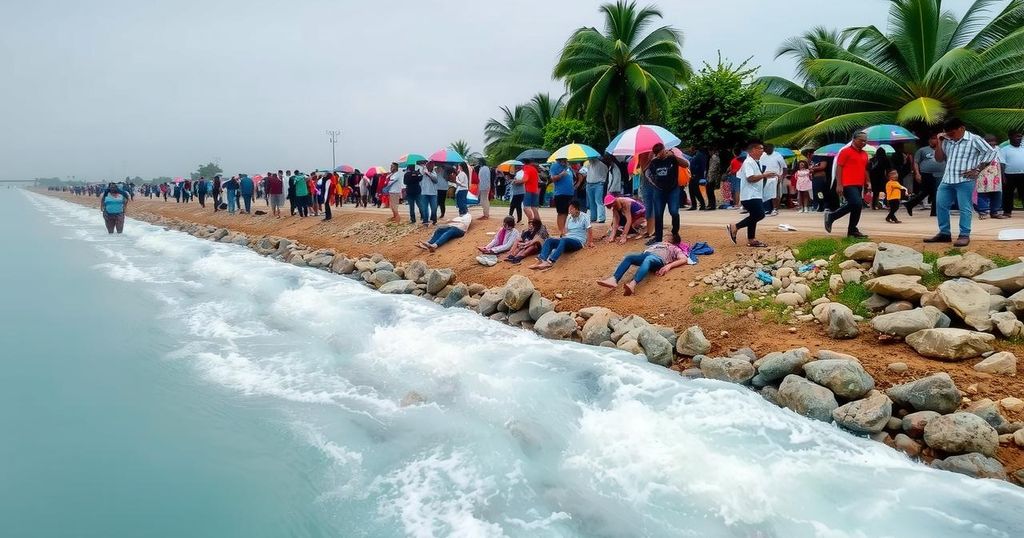Iranian Influx to Venezuela via Colombia Triggers Regional Security Concerns

The influx of Iranians into Colombia, linked to Venezuela, raises security concerns amid deepening ties between Tehran and Caracas. Venezuelan President Maduro’s re-election celebrations included support for Iran, while the return of Alex Saab, key in consolidating cooperation, amplifies these connections. Counterfeit documents among Iranian migrants point to a sophisticated network, alongside military collaborations with Hezbollah, posing challenges for regional security and stability.
The recent influx of Iranian nationals into Colombia, often utilizing fraudulent passports allegedly connected to Venezuela, has sparked significant concerns among Latin American security officials and Western diplomats. This development coincides with Venezuelan President Nicolás Maduro’s contentious re-election celebrations on January 10, during which he displayed solidarity with Iran by proclaiming “Long live the Islamic Republic of Iran”. Observers note that this is indicative of the strengthening ties between Iran and Venezuela, particularly as Maduro seeks allies amid increasing international isolation following accusations of electoral fraud in last July’s elections.
Iranian Foreign Ministry Spokesman Esmail Baghaei publicly supported Maduro, promising enhanced cooperation against what he termed “evil interventions and unilateral and illegal US sanctions.” This alignment with nations such as Russia, Cuba, and Nicaragua shows Tehran’s growing influence in Venezuela as the Maduro regime struggles to gain legitimacy on the world stage. The return of Alex Saab, a Colombian businessman previously imprisoned in the U.S., has reportedly accelerated collaboration between Caracas and Tehran, where he now serves as Minister of Industry, further solidifying their economic and strategic interests.
Colombian authorities have observed a trend in which Iranian migrants attempt to transit through the country with sophisticated counterfeit Greek documents. Notable incidents include three Iranian nationals intercepted at Bogotá’s El Dorado International Airport and another instance of an Iranian woman attempting to travel to Nicaragua with a forged passport. Security sources have labeled these forgeries as “highly professional,” indicating possible state backing and suggesting a coordinated effort across borders.
Moreover, the growing Iranian presence in Venezuela extends into military cooperation; reports indicate that both nations have developed a substantial military-technical partnership, which includes a joint drone development program at the El Libertador airbase. Analysts envision potential threats posed by Hezbollah, as the group is reportedly establishing operational centers within Venezuela. According to foreign policy expert Joseph M. Humire, Hezbollah’s operatives blend into the local economy and political structures, deeply embedding themselves within Venezuelan society.
Economic ties between Iran and Venezuela have also evolved, characterized by Iran’s Mahan Air operating regular flights between the two nations, enabling a gold-for-oil exchange that circumvents international sanctions. The signing of 289 bilateral agreements last November signifies an expansion across various sectors, including technology and defense, highlighting the profound development of relations since the Hugo Chávez administration.
The growing Iranian presence in Latin America, particularly through Venezuela, has raised alarms regarding regional security. Venezuelan President Nicolás Maduro’s government, which relies on allies like Iran, Russia, and Cuba for support amid international isolation, has intensified bilateral agreements with Iran in response to challenges from the United States and its Western allies. Furthermore, the involvement of Iranian nationals, utilizing fraudulent documentation to navigate through Colombia, illustrates the complexities of border security and migration in the region. The military and economic collaborations between these nations also reflect a shared agenda that poses potential threats to regional stability.
The Iranian influx into Venezuela, accompanied by fraudulent activities and strengthened military ties, signifies a complex nexus of geopolitical concerns for Latin America and beyond. The evolving partnerships between nations isolated by Western sanctions, particularly in the defense and economic sectors, pose a growing threat to regional stability. The situation underscores the urgent need for heightened vigilance among security officials and policymakers to mitigate potential risks arising from this transcontinental alliance.
Original Source: www.intellinews.com








